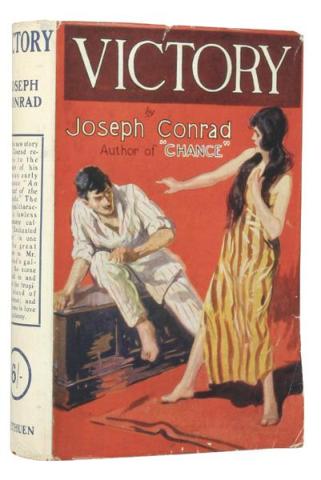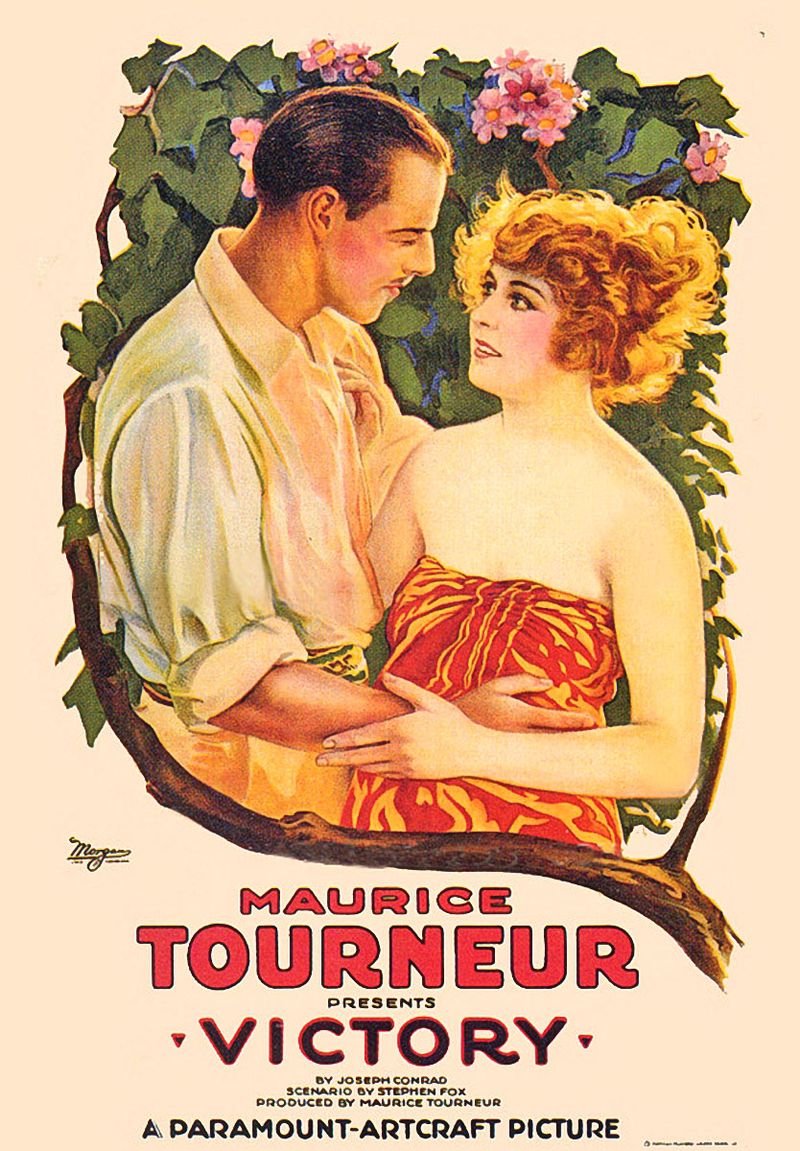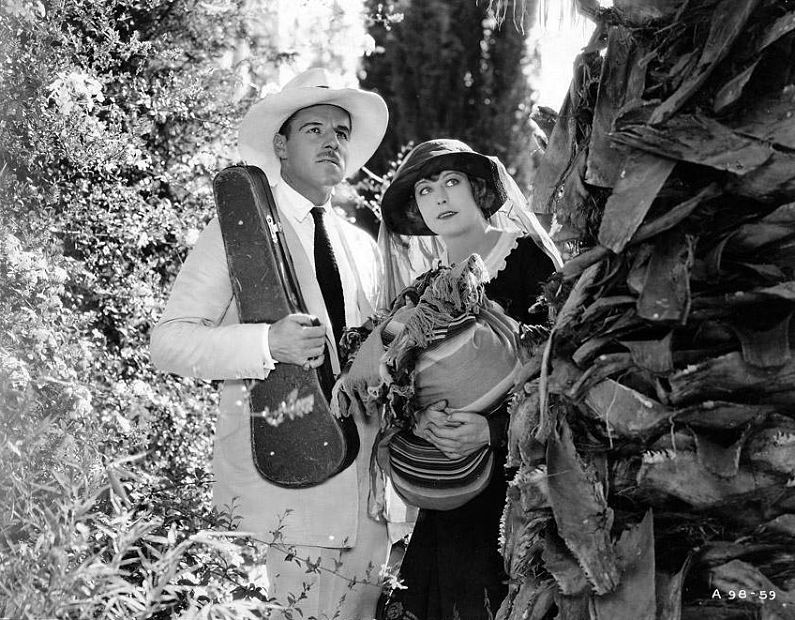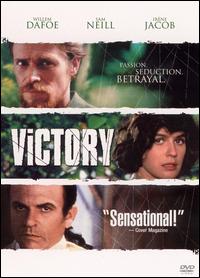<Back to Index>
This page is sponsored by:
PAGE SPONSOR

Victory (also published as Victory: An Island Tale) is a psychological novel by Joseph Conrad first published in 1915, through which Conrad achieved "popular success." The New York Times, however, called it "an uneven book" and "more open to criticism than most of Mr. Conrad's best work."
The novel's "most striking formal characteristic is its shifting narrative and temporal perspective" with the first section from the viewpoint of a sailor, the second from omniscient perspective of Axel Heyst, the third from an interior perspective from Heyst, and the final section.
It has been adapted into film a number of times.
Through a business misadventure, the European Axel Heyst ends up living on an island in what is now Indonesia, with a Chinese assistant Wang. Heyst visits a nearby island when a female band is playing at a hotel owned by Mr. Schomberg. Schomberg attempts to force himself sexually on one of the band members, Alma, later called Lena. She flees with Heyst back to his island and they become lovers. Schomberg seeks revenge by attempting to frame Heyst for the "murder" of a man who had died of natural causes and later by sending three desperadoes (Pedro, Martin Ricardo and Mr. Jones) to Heyst's island with a lie about treasure hidden on the island. The three die (Wang kills one) but Lena dies as well and Heyst is overcome with grief and commits suicide.
In Notes on My Books: Easyread Edition, Conrad wrote of his "mixed feelings" about the initial reception of the book which had been published while Europe had been engaged in fighting the great war. The initial reception of the work had considered it "a melodramatic, rather Victorian novel, representing Conrad's artistic decline." However, later critiques have described it as "a highly complex allegorical work whose psychological landscape and narrative structure lay the groundwork for the modern novel."
The character of Heyst has been compared to Shakespeare's Hamlet with the story itself drawing heavily on The Tempest and the ending of the work like "an Elizabethan stageplay where the stage is clogged with corpses" Allen Simmons states that the character of Lena was shaped by Therese from the 1894 French novel Le Lys rouge ('The Red Lily'), by Anatole France.
Adam Gillon and Raymond Brebach have proposed that Vladimir Nabokov's rejection of Conrad's "souvenir - shop style, and bottled ships and shell necklaces of romanticist cliches" resulted in Conrad's Victory being "one of the principal sources of inspiration" for Lolita through what they call "typical Nabakovian reversal."
The novel has been adapted to film multiple times including a 1919 silent version directed by Maurice Tourneur featuring Jack Holt, Seena Owen, Lon Chaney, Sr., and Wallace Beery; the 1930 William Wellman directed Dangerous Paradise, starring Nancy Carroll, Richard Arlen and Warner Oland; the 1940 version, directed by John Cromwell, featuring Fredric March, Betty Field, and Sir Cedric Hardwicke; and a 1995 version directed by Mark Peploe, with Willem Dafoe, Sam Neill, Irčne Jacob and Rufus Sewell. British dramatist Harold Pinter prepared a screenplay for a film, never made, from which the BBC broadcast a radio adaptation in 2015.


Victory is a surviving 1919 American drama film directed by Maurice Tourneur, starring Jack Holt, Seena Owen, Lon Chaney and Wallace Beery. The movie is an adaptation of the eponymous novel by Joseph Conrad. The screenplay was written by Jules Furthman. It provides a rare opportunity to see Chaney and Beery in the same film.
As described in a film magazine, Axel Heyst (Holt), a strange and silent man, forms but one friendship being that of a sailing man without any apparent resources, who rewards this charitable assistance by giving Heyst a half interest in coal deposits on a South Seas island. Difficulties arise which cause Heyst to return to civilization where he meets and rescues from her annoyers Alma (Owen), an abused member of a hotel entertainment company. He takes the young woman back with him to the island, quartering her in an abandoned shack. It is not in Heyst's nature to love, so there is nothing of sentiment in their relationship. A trio of fortune hunters led by Mr. Jones (Deeley), hearing tales of Heyst's valuable possessions, come to the island and attempt to take his treasure and the young woman. It is then when Heyst discovers his love for Alma. Heyst triumphs over his persecutors and a happy ending results.
Starring: Jack Holt as Axel Heyst, Seena Owen as Alma, Lon Chaney as Ricardo, Wallace Beery as August Schomberg, Ben Deeley as Mr. Jones, Laura Winston as Mrs. Schomberg, Bull Montana as Pedro, George Nichols as Captain Davidson
Victory is a 1940 film based on the popular novel by Joseph Conrad. On the eve of the American entry into World War II, the often filmed Conrad story of a hermit on an island invaded by thugs was refashioned into a clarion call for intervention in the war in Europe, at the height of American isolationism.
Cromwell's 1940 film adaptation for Paramount repeated a story that had already been made by Paramount into film in 1930 by William Wellman, retitled as Dangerous Paradise and, in 1919, was Conrad's first novel to be filmed in a silent version with Lon Chaney Jr.. Cromwell's version was adapted by John Balderston, who'd written a number of Universal horror pictures, such as Dracula, and the popular The Prisoner of Zenda also directed by Cromwell.
Widely considered the best film version, the 1940 film starred Oscar winning Fredric March, in the steamy tropical psychological thriller, with Betty Field as the female lead (March had begged the recently arrived Ingrid Bergman to do it but she'd refused).
Set in the present day, Fredric March's intellectual British recluse has vowed to close himself off from the world and now lives alone on an island in the Dutch East Indies. But the bitter man is forced to break this promise to himself when lovely traveling showgirl Betty Field, also fleeing from the world, is threatened by three murderous scavengers on one dreadful evening. The villains are led by Cedric Hardwicke who stands out as a creepy, soulless villain, as does his Cockney sidekick, Jerome Cowan, whom Hardwicke treats with surprisingly explicit sexual sadism. They switch their attentions from Field to March when they believe that March's character has untold wealth to plunder. The morose March is motivated by love and their savagery to return to the real world and do his part, but his regeneration is tinged by tragedy. Though an uneven movie (it's possible the book was unfilmable, says one review), the 1940 Victory succeeds in its ability to convey Joseph Conrad's overall sense of doom and foreboding.
This is doubtless because Cromwell and March, both ardent anti - fascists in favor of then neutral United States joining Britain in the fight against Hitler, were themselves fearing the rise of Nazism in Europe. They refashioned Conrad's 1915 novel into a critique of the perils of isolationism - an issue then rending the US apart as England suffered under the London Blitz from Nazi bombers while the majority of Americans wanted nothing to do with the war.
The happy ending tacked onto to all three Paramount versions, in which March and Fields spend their lives together in bliss on the island, did not help the film, not least because March and Fields had very little on-screen chemistry in the first place.
"This film version of Joseph Conrad's novel impresses with several strongly individual performances rather than with the basic movement of the story itself," read a review in Variety. Bosley Crowther of The New York Times was even less enthusiastic: "The only things that distinguish it," he wrote, "are a star cast and smooth direction." Harrison's Reports called it "A strong but somewhat sordid drama, suitable only for adults. The direction is skillful, the acting realistic, and the production values good; but the story is somewhat brutal." Film Daily described it as "at all times gripping and exciting" and called Fredric March "highly effective". John Mosher of The New Yorker called the film "definitely expert, with a proper allotment of excitement and atmosphere," although he found the later scenes "too bald" in their simplification of the novel.
No one, apparently, noticed its application to the present day, and, despite the generally positive reviews, it failed to ignite at the box office. However, its lush cinematography by Leo Tover was noted by critics at the time. It has recently been rediscovered by film buffs and is finally available online.
Starring: Fredric March as Hendrik Heyst, Betty Field as Alma, Sir Cedric Hardwicke as Mr. Jones, Jerome Cowan as Martin Ricardo, Sig Rumann as Mr. Schomberg, Margaret Wycherly as Mrs. Schomberg, Fritz Feld as Seńor Makanoff, Lionel Royce as Pedro, Alan Ladd as Heyst Jr.
The film had been in development at Paramount for a number of years, allegedly due to the difficulty in securing an appropriate male lead. Filming started 15 March 1940.

Victory is a 1996 French - German drama suspense film written and directed by Mark Peploe and starring Willem Dafoe, Irčne Jacob, Sam Neill and Rufus Sewell. It is based on the novel of the same name by Joseph Conrad.
The novel had been adapted into film on multiple previous occasions, including a 1919 silent version directed by Maurice Tourneur and featuring Jack Holt, Seena Owen, Lon Chaney, Sr., and Wallace Beery; the 1930 William Wellman directed Dangerous Paradise, starring Nancy Carroll, Richard Arlen and Warner Oland; and the 1940 version, featuring Fredric March, Betty Field and Sir Cedric Hardwicke.
Through a business misadventure, the European Axel Heyst (Willem Dafoe) ends up living on an island in what is now Indonesia with a Chinese assistant Wang (Ho Li). Heyst visits a nearby island where a female band is playing at a hotel owned by Mr. Schomberg. Schomberg attempts to force himself sexually on one of the band members, Alma (Irčne Jacob). Alma is about to be sold to Schomberg by the corrupt leader / director of the band who has enslaved the women for prostitution. She begs Heyst to help her. Having sworn off close relationships because of his past, he is challenged by her request, but agrees to help her. He escapes from the island with Alma, and they go back to his island and eventually become lovers. Schomberg seeks revenge by attempting to frame Heyst for the "murder" of a man who had died of natural causes and later by sending three desperadoes Pedro, Martin Ricardo (Rufus Sewell), and Mr. Jones (Sam Neill) to Heyst's island with a lie about a treasure hidden on the island. Upon their arrival at the island, much intrigue ensues. In a climactic scene, Jones kills Pedro and then Ricardo; Alma is also shot and dies in the arms of Axel. After burning his compound and burying Alma, Axel disappears from the island but is rumored to have later been seen as a drifter in San Francisco and other ports of call. Alma's victory, in death, is having saved Axel's life in that he has again made connections with others.
Starring: Willem Dafoe as Axel Heyst, Sam Neill as Mr. Jones, Irčne Jacob as Alma, Rufus Sewell as Martin Ricardo, Jean Yanne as Mr. Schomberg, Ho Yi as Wang, Bill Paterson - Capt. Davidson, Irm Hermann - Mrs. Schomberg, Graziano Marcelli - Pedro, Hansi Jochmann - Mrs. Zangiacomo, Simon Callow - Zangiacomo, Michael Lee - Chinese Gentleman, Leonard Maguire - Old Trader McNab.
The principal photography of the movie were done at Situbondo and Asembagus regency in East Java, Indonesia. Some depictions of old Surabaya were also done in the same place.